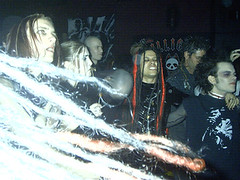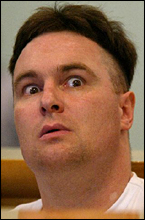Apathy Jack writes:
I remember when I went to Boarders looking for a copy of A Child Called ‘It’ - Dave Pelzer’s harrowing account of his childhood, where he suffered experiences that were, from memory, classified as the third worst case of recorded child abuse in America.
“Hmm,” I thought to myself. “I wonder where they keep the autobiographies?”
Searching fruitlessly for a time, I decided to go for the more general “non-fiction” section.
Couldn’t find that either.
“Excuse me,” I asked the information drone. “Where would I find your biography section?”
“Don’t have one.” Replied the book drone.
“Alright, how’s about non-fiction?”
“Don’t have one of those either.”
“Then where do you suppose I’d find A Child Called ‘It’?” I asked.
“For that book,” he said, looking at his computer. “You’ll need to look in our Child Abuse/Incest section.”
And that was how I learned that Boarders doesn’t have a biography section or a non-fiction section, but does have a child abuse/incest section.
It’s like the dirt just won’t come off, you know.
What was my point?
Oh yeah, you should all be reading more. So, for your edification, here is a reading list:
There is of course the aforementioned A Child Called ‘It’ – one of the only truly upsetting reads I’ve had. This is available by itself, or collected in My Story which is the full volume of Pelzers tale, including the sequels The Lost Boy and A Man Named Dave. Reading them all is good for completeness (and a sense of closure), but I must say they drag a little. Pelzer is remarkable for his past, not his writing ability, and as his life gets more and more on track (towards the middle of the second book or thereabouts) it becomes, sadly, a lot less interesting to read about...
Another favourite is THEM by Jon Ronson – subtitled ‘Adventures with Extremists’ it is basically a series of profiles of people like David Icke and the Grand Dragon of the Ku Klux Klan who is spearheading a new initiative to ban the use of the "N" word.
Ronson is, by trade, a humour writer, but he knows when to pull back and let the innate ridiculousness of the extremists show through.
Ronson’s second book The Men Who Stare At Goats has recently been released, which is basically THEM applied to a military conspiracy called The First Earth Division, which would be laughable if there wasn’t evidence of holdover ideas from this hippy-era military plan being applied in places like Iraq...
Worth a brief perusal is A Million Little Pieces – James Frey’s autobiographical tale of his time in rehab, overcoming drug and alcohol problems he had since the age of ten. Frey is a brilliant writer who presents some very powerful scenes; I challenge anyone to sit through the chapter where he undergoes root canal surgery - sans painkillers - without flinching.
The book is let down a little by how increasing difficult it becomes to suspend disbelief as the story goes on. While it is human nature to make oneself the hero of one’s narrative, by the last few chapters I was expecting the book to end with Frey being crucified to save Mankind from it’s sins and returning from the dead three days later...
A book I’m now onto my second copy of is Cruddy, by Lynda Barrie. In order to convince you that this book is worth reading, I will simply cut and paste the prologue of the book in its entirety:
When we first moved here, the mother took the blue-mirror cross that hung over her bed in our old house and nailed a nail in it for the new bedroom of me and my sister. Truthfully it is a cross I have never liked. The Jesus of it seems haunted. He’s the light absorber kind. In the pitch-black middle of the night he will start to glow green at you with his arms up like he is doing a tragic ballet. Some nights looking at him scares me so bad I can hardly move and I start doing a prayer for protection. But when the thing that is scaring you is already Jesus, who are you supposed to pray to?
Another damn fine read is, well, anything by Christopher Brookmyre – especially Not The End Of The World, where Brookmyre looks at religious extremism, and A Big Boy Did It And Ran Away, his treatise on terrorism (which earned some small notoriety by being released in the first week of September 2001 with a blurb that boldly announced “Terrorism is the new rock and roll!”).
Brookmyre writes fiction – crime stories which almost always have a smart-mouthed Glaswegian as the main character. He also gets hugely didactic at times, telling you what he thinks about the ills of human stupidity with all the subtlety of a charging rhino. However, his sense of comedic description makes these rants a part of the narrative, rather than an impediment to it.
Also worth a look is The Corrections by Jonathon Franzen. The story of two octogenarians and their three grown-up children, and how life hasn't really worked out the way they thought it would.
Franzen is most famous not for his books (the first two of which came and went relatively unnoticed by the majority of the public) but for being "dis-invited" from Oprah's Book Club, which The Corrections got him into. Despite this, I have to say, the man writes better than Jesus, and this book is an amazing read.
I lent the book to a friend of mine and she read the first hundred or so pages before getting so depressed by the horrible things that happen to the characters that she had to cheer herself up by reading a Sylvia Plath biography.
You just don't get 'depressing' of that quality too often.
Finally, I’ve been rereading a lot of Henry Rollins of late.
Over the last twenty odd years, Rollins has published over a dozen books of poetry and prose, all of which are themed around the same idea as his three dozen or so CDs of music (first with Back Flag then with The Rollins Band) and spoken word: The idea that Henry Rollins is very angry all of the time.
His writing is definitely an acquired taste (which is a polite way of saying I’m pretty certain you’ll like the other stuff I’ve recommended but less sure about this ‘un). Ah, hell, here’s the man himself:
I see walking bombs on the street
Hearts not beating, but ticking
I’m talking about detonation!
Rollins is the master of nervous breakdown writing – words that aid and abet my occasional spiral into hideous dysfunctionality.
For the beginner, I’d recommend The Portable Henry Rollins, excerpts from twelve of his books. In addition to being a good yard stick as to whether you’ll like his work, it also highlights the faintly upsetting fact that in Solipsist, published in the late nineties, Rollins is still dealing with exactly the same hatred and anger that he presents in High Adventure In The Great Outdoors, his first collection of writing from the early eighties. He’s a poster child for rage, not for healthily working through your issues and living a life of contentment.
Hell, I still wince a little when I read the longing description: You are beautiful like demolition.
Anyhoo, the above are the things worth reading. So get the hell away from the internet and read an actual book. Everything I’ve mentioned can be found at any halfway reputable literature merchant – if you’re in Auckland, a trip to Boarders will net you all of these in one go. Off you go – step away from the computer and get some real reading down you.
..
Now for the interactive part of this: What should I be reading, and why? I want replies from as many people as possible, because I will actually make an effort to procure and read what is recommended.
Two things to keep in mind:
1) To convince me to spend hard-earned hamburger tokens on your recommendations, I may need reasons that are slightly more in-depth than “Dis buk iz teh coolzor.”
2) I’m a grown up, so Harry Potter books and anything with elves in it should, of course, not be suggested by anyone for any reason.
Go crazy wild.



